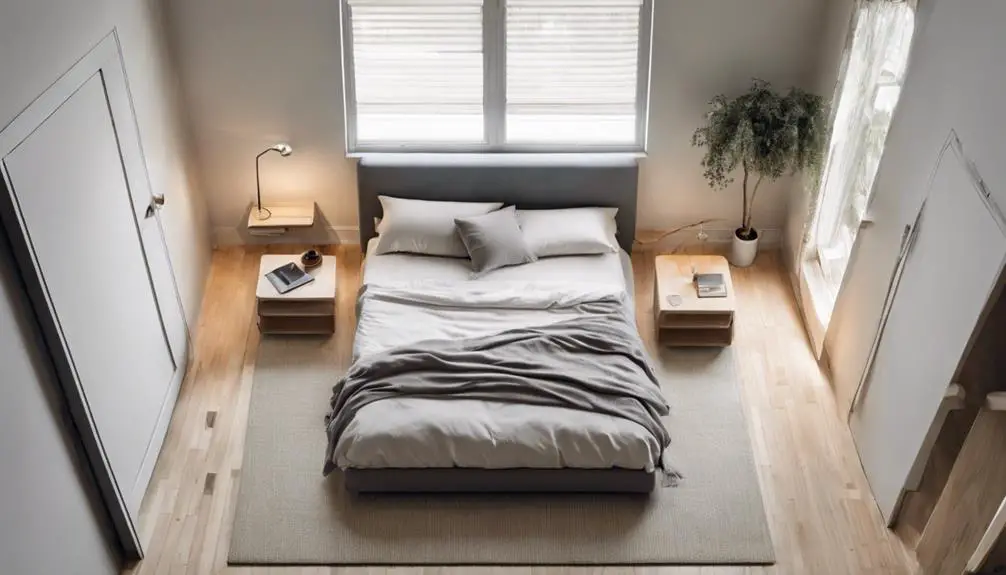Curious about how bed placement influences your life? Discover the best Feng Shui position for your bed and unlock harmony and better sleep.

In Feng Shui What Is the Best Position for a Bed
Surely you've spent sleepless nights pondering the Feng Shui of your bed placement, haven't you? Well, it's not as trivial as it sounds.
Feng Shui, the ancient Chinese art of spatial arrangement, states that the positioning of your bed can influence your life in profound ways. It's about directing energy flow, promoting harmony, and improving sleep.
But what's the best position for a bed? Ah, that's where things get interesting. Stay with me, I promise it's worth your time.
Key Takeaways
- The ideal bed position in Feng Shui is the commanding position, offering control and balance.
- Incorrect bed positioning, such as in corners or under sloping ceilings, disrupts energy balance and sleep quality.
- The bedroom colors and bed size significantly influence mood, energy flow, and subsequently, sleep quality.
- Avoiding heavy objects above the bed and mirrors facing the bed can significantly enhance sleep and create a peaceful environment.
Understanding the Basics of Feng Shui

To truly grasp the concept of optimal bed placement, it's essential you first understand the fundamentals of Feng Shui. This ancient Chinese practice aims to harmonize individuals with their surrounding environment. Central to Feng Shui principles is the belief that energy, known as 'chi', flows through every living and non-living entity. This chi should flow smoothly and freely; any disruption is seen as negative, leading to disharmony and imbalance.
Understanding energy flow is crucial to Feng Shui. The layout of your home, including the placement of furniture, affects this flow. You're encouraged to arrange your space to enhance positive energy flow and mitigate negative influences. It's about achieving balance and harmony, both visually and energetically.
Each room in your home is associated with a particular life aspect such as health, wealth, or love. The bedroom, for instance, represents rest and relaxation. Therefore, the aim is to create a tranquil and peaceful space that promotes good health and well-being, through the judicious use of Feng Shui principles.
The Significance of Bed Positioning

In Feng Shui, the position of your bed plays a pivotal role in dictating the quality of energy flow, consequently impacting your sleep, health, and overall well-being. It's not just about where you place your bed, but also the direction in which you sleep. This is the essence of 'Sleeping Direction Importance'. For example, sleeping with your head pointing towards the North, according to Feng Shui, could lead to restless nights, while the South is said to promote a deeper, more restful sleep.
The relevance of bed size, or 'Bed Size Relevance', is another crucial element. It's not only the physical size that matters, but also the proportionality of your bed to the room. A bed that's too large can dominate the space, obstructing the free flow of energy and creating a feeling of imbalance. Conversely, a bed too small mightn't provide the comfort and support needed for quality sleep.
Ideal Bed Positions in Feng Shui

Navigating the principles of Feng Shui, you'll find that the ideal position for your bed is far from arbitrary, as it's believed to significantly influence your energy, sleep quality, and overall health. The concept is simple, yet the impact is profound.
Take into account the bedroom colors. Their impact on your mood and energy is undeniable. Light, natural tones are recommended to promote tranquility and rest.
Investing in an adjustable bed could bring additional benefits. It allows you to easily shift the position, which can help align with Feng Shui principles and enhance your comfort.
To better illustrate, consider the following table:
| Position | Description | Impact |
|---|---|---|
| Commanding Position | Bed is placed diagonally opposite the door | Encourages feelings of control, security |
| Floating Position | Bed is placed in the center of the room | Promotes balance, harmony |
| Against the Wall | Bed is placed against a solid wall | Provides support, protection |
Common Feng Shui Bed Positioning Mistakes

While mastering the art of Feng Shui bed positioning, it's easy to make a few common mistakes that can disrupt your energy balance and sleep quality. Misplaced furniture effects can be one of the major culprits. Placing your bed against a window or directly in line with the door can cause energy, also known as 'Chi', to rush towards you, resulting in restless sleep.
Incorrect room layout is another common error. If your bed is positioned in such a way that your feet are directly in line with the door when you're lying down – a position known as the 'Death Position' in Feng Shui – this can lead to bad dreams and a restless night. Moreover, placing your bed in a corner or under a sloping ceiling can also lead to a disturbed energy flow.
Avoid placing heavy objects or storage above your bed as it can create a sense of pressure. Mirrors facing the bed can disrupt your peace as they're believed to bounce energy around the room. Remember, Feng Shui is all about maintaining a harmonious energy balance for a comfortable and peaceful sleep.
Enhancing Sleep Quality With Feng Shui

Mastering the principles of Feng Shui can significantly enhance your sleep quality by fostering a serene and harmonious environment in your bedroom. You can utilize Feng Shui to craft sleep rituals that work for you and understand how color effects can impact your sleep.
Begin with setting up sleep rituals. Feng Shui suggests consistency and tranquility, so make sure your bedtime routine reflects that. Whether it's reading a book or having a calming cup of herbal tea, consistency in your routine helps signal your body that it's time to wind down.
As for color effects, Feng Shui associates specific colors with different energies. Blues and greens promote tranquility and healing, making these ideal choices for your bedroom. Avoid colors like reds and oranges, as they are associated with energy and passion, which can disrupt sleep.
Here's a quick table to guide you:
| Sleep Rituals | Feng Shui Colors |
|---|---|
| Consistent bedtime routine | Blues and Greens |
| Wind-down activity (reading, tea) | Avoid Reds and Oranges |
Understanding and implementing Feng Shui can lead to a dramatic improvement in your sleep quality. So, go ahead and create your serene, harmonious bedroom. Your body and mind will thank you for it.
Frequently Asked Questions
What Colors Are Best to Use in the Bedroom According to Feng Shui Principles?"
In Feng Shui, color symbolism plays a crucial role. So, for your bedroom, you'll want to choose colors that enhance positive energy flow.
Warm, earthy tones like browns, beiges, and yellows promote stability and relaxation. Greens symbolize growth and renewal. Cool blues and whites foster calmness and purity.
How Does the Position of Other Furniture in the Bedroom Affect Feng Shui?"
Other furniture's position in your bedroom significantly impacts Feng Shui. Room clutter, for instance, disrupts the energy flow, creating a stagnant and negative environment.
Your bedside tables should be balanced and not too cluttered. It's important to arrange furniture to encourage a smooth flow of energy. Remember, harmony and balance are key in Feng Shui. So, maintain symmetry and avoid overcrowding.
This will promote positive energy, better sleep, and overall wellbeing.
Are There Specific Materials to Avoid When Choosing a Bed From a Feng Shui Perspective?"
In Feng Shui, your bedding selection greatly matters. You should avoid beds made from metal as they're believed to interrupt the natural energetic flow.
Also, for mattress types, it's suggested to avoid spring mattresses as they can create an energetic imbalance. Opt for natural materials, like a wooden bed frame and a mattress made of cotton or wool.
These materials are believed to enhance positive energy flow, providing you with a restful sleep.
What Is the Role of Mirrors in the Bedroom According to Feng Shui?"
In Feng Shui, mirror placement plays a crucial role in maintaining balance in your bedroom. Reflective surfaces, like mirrors, are believed to bounce energy around the room, which can be disruptive to your rest.
It's best to position mirrors carefully, avoiding direct reflection of the bed. Also, never place a mirror facing the bedroom door. Remember, Feng Shui emphasizes serenity in your sleeping space, and mirrors should be used thoughtfully to ensure this.
Does the Orientation of the Bedroom Door Affect Feng Shui?"
Yes, the orientation of your bedroom door greatly affects the Feng Shui. Door symbolism is crucial as doors represent the mouth of the home, where energy enters. Ideally, you shouldn't see the door from your bed, but it should be easily accessible. This allows for a smooth, uninterrupted energy flow.
However, don't stress if this isn't possible. There are other Feng Shui tools you can use to improve the energy in your bedroom.
Conclusion
In conclusion, your bed's position greatly impacts your well-being, according to Feng Shui. Placing it in command position promotes better sleep, health, and overall harmony.
However, avoid common mistakes like positioning it across from the door. Remember, enhancing sleep quality is more than just about aesthetics, it's about harmonizing your energy.
So, tweak your bed placement and experience the difference that Feng Shui can make in your life.



Sign up